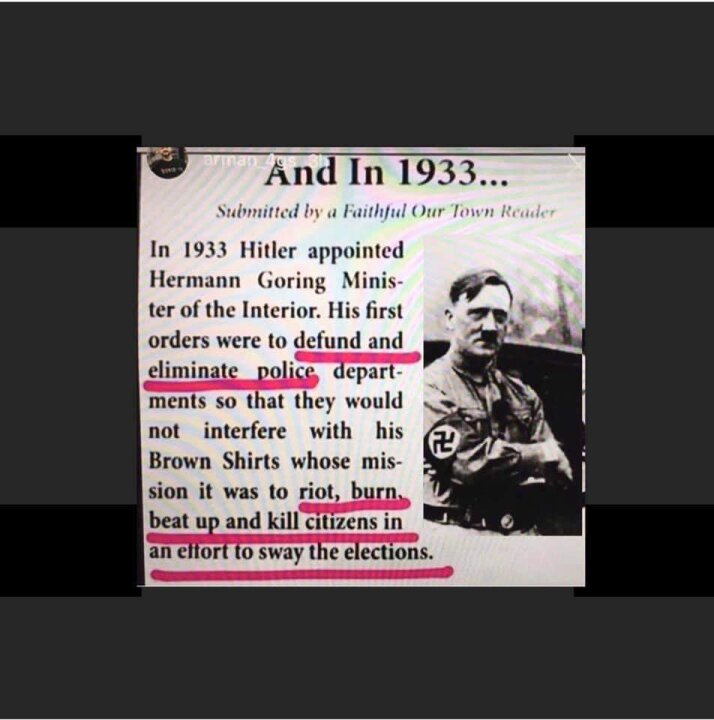This page is a permanent link to the reply below and its nested replies. See all post replies »
QuixoticSoul · 41-45, M
Lmao.
You goofball.
Timothy Snyder, professor of history at Yale University specializing in the history of Central and Eastern Europe and the Holocaust ( here ), told Reuters via email that the claims made in the posts are “absolutely baseless.”
After the Enabling Act of 1933 ( here ) ceded almost all political authority to Hitler, Snyder laid out four key actions that took place with regards to German policing. Firstly, the highly decentralized police departments were brought under a unified central command. Secondly, “the unified police forces were then placed under the same ultimate command as the SS” (the acronym for the infamous “Schutzstaffel” paramilitary group, here ). Thirdly, led by Heinrich Himmler, the SS officers were brought into the police (comprised of the Ordnungspolizei (orpo) "regular police", the Sicherheitspolizei (Sipo) "security police” which initially included the Gestapo, and the Sicherheitsdienst (SD) "security service”). Finally, “police were trained to understand crime as a matter of race,” the result of which, Snyder explained, “was the creation of a police force that took active part in the Holocaust.”
Corresponding with Reuters via email, Peter Fritzsche, a professor of history at the University of Illinois ( here ) and author of “Hitler’s First Hundred Days” (here ), likewise debunked the claim.
According to Fritzsche, when Goering became Interior Minister for Prussia, he gained executive power over the largest police force in the country. Very quickly, Goering demanded that the police act to protect the Nazi state, making it clear that the police would serve the nationalist forces over the opposing socialists or communists.
Three weeks into his new role, he officially designated the paramilitary brownshirts (also known as the SA, an abbreviation for Sturmabteilung) in Prussia as auxiliaries of the Prussian police with the power to arrest. Fritzsche explained that the regular police and the SA initially worked together until late February 1933, when emergency legislation suspended the Constitution following the Reichstag Fire ( here ) and the SA began to act more independently.
During this time, “the police were mobilized by the Nazis, not sidelined,” Fritzsche said, and there was “no defunding of police at all.”
After the Enabling Act of 1933 ( here ) ceded almost all political authority to Hitler, Snyder laid out four key actions that took place with regards to German policing. Firstly, the highly decentralized police departments were brought under a unified central command. Secondly, “the unified police forces were then placed under the same ultimate command as the SS” (the acronym for the infamous “Schutzstaffel” paramilitary group, here ). Thirdly, led by Heinrich Himmler, the SS officers were brought into the police (comprised of the Ordnungspolizei (orpo) "regular police", the Sicherheitspolizei (Sipo) "security police” which initially included the Gestapo, and the Sicherheitsdienst (SD) "security service”). Finally, “police were trained to understand crime as a matter of race,” the result of which, Snyder explained, “was the creation of a police force that took active part in the Holocaust.”
Corresponding with Reuters via email, Peter Fritzsche, a professor of history at the University of Illinois ( here ) and author of “Hitler’s First Hundred Days” (here ), likewise debunked the claim.
According to Fritzsche, when Goering became Interior Minister for Prussia, he gained executive power over the largest police force in the country. Very quickly, Goering demanded that the police act to protect the Nazi state, making it clear that the police would serve the nationalist forces over the opposing socialists or communists.
Three weeks into his new role, he officially designated the paramilitary brownshirts (also known as the SA, an abbreviation for Sturmabteilung) in Prussia as auxiliaries of the Prussian police with the power to arrest. Fritzsche explained that the regular police and the SA initially worked together until late February 1933, when emergency legislation suspended the Constitution following the Reichstag Fire ( here ) and the SA began to act more independently.
During this time, “the police were mobilized by the Nazis, not sidelined,” Fritzsche said, and there was “no defunding of police at all.”
You goofball.




